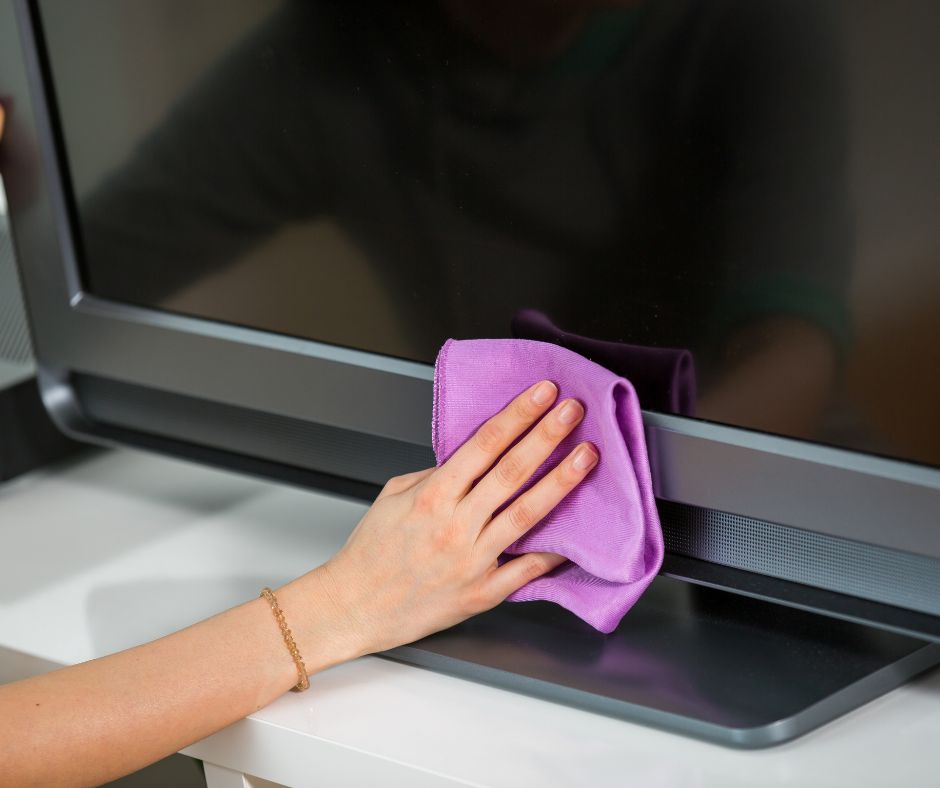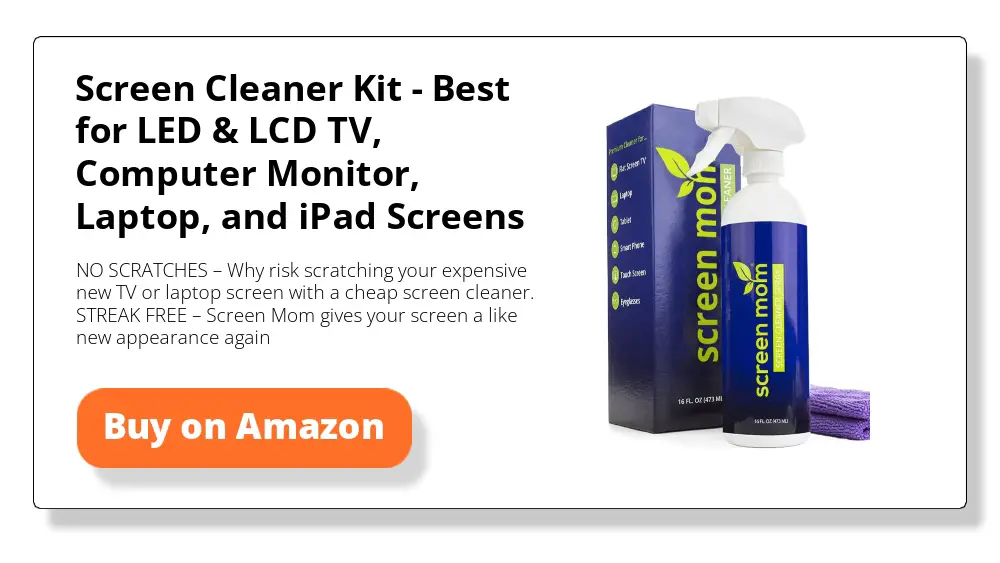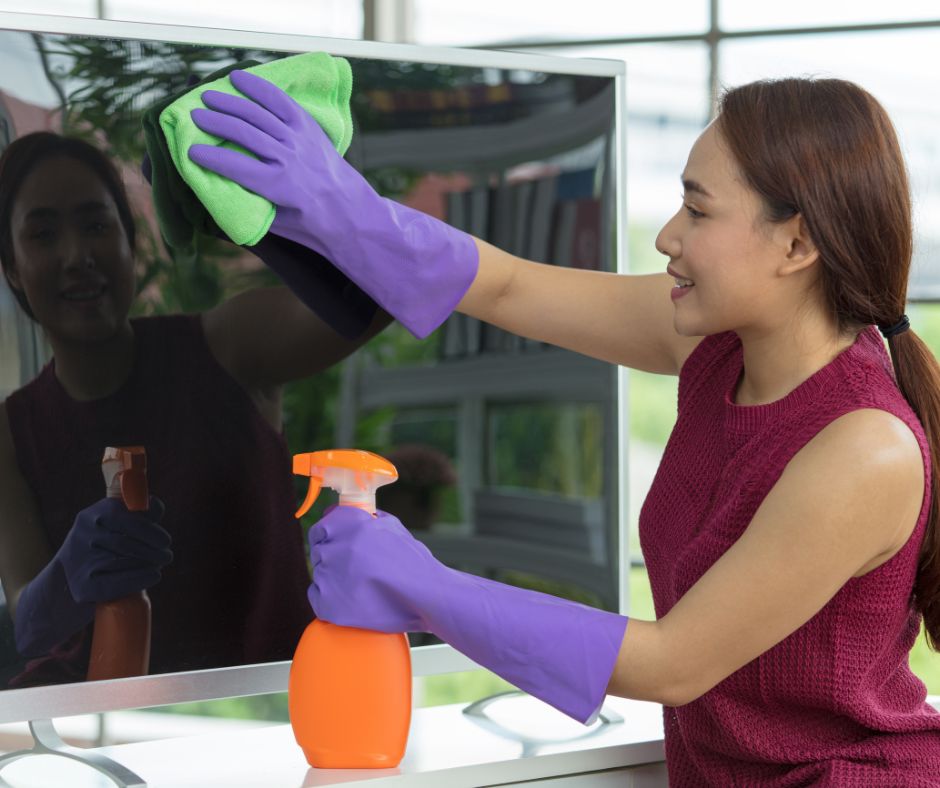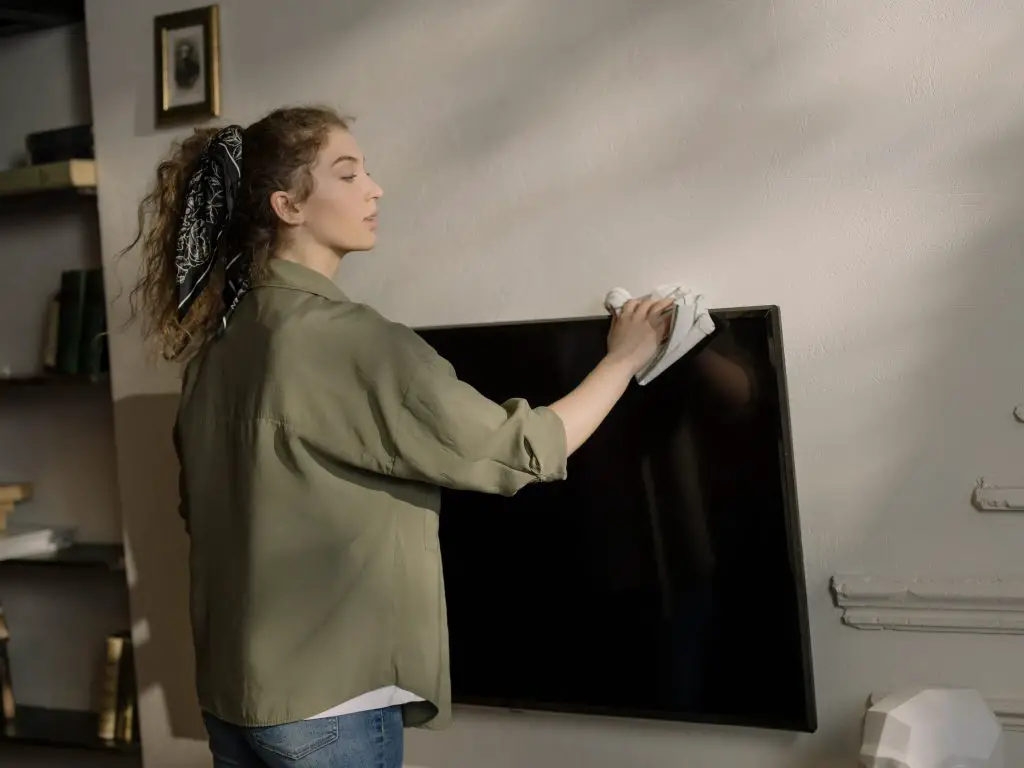It goes without saying that we now live our lives mostly through our TVs. And keeping your TV screen clean has becoming equally crucial as more people remain indoors and binge-watch their favourite programs or streaming flicks.
Regretfully, many times people forget to do this chore, and a filthy screen can seriously impair viewing quality. Our TV displays are continually exposed to sources of filth that affect picture quality, from fingerprints to dust, dirt and grime.
Contents
Achieving a Smudge-Free Screen in 7 Easy Steps

Achieving a smudge-free TV screen requires regular cleaning and proper techniques. Here are some steps to follow to achieve a smudge-free TV screen:
- Turn off the TV. Before you start cleaning, turn off the TV and unplug it from the wall. This will prevent any electrical shock or damage to the TV.
- Use a microfiber cloth. A microfiber cloth is the best tool for cleaning a TV screen because it is gentle and doesn’t leave any scratches. Make sure the cloth is clean and free of any debris that can scratch the screen.
- Avoid using cleaning agents. Cleaning agents or chemicals can damage the TV screen, so it’s best to avoid them altogether. Instead, use a microfiber cloth dampened with distilled water to clean the screen.
- Be gentle. When cleaning the TV screen, use a light touch and avoid pressing too hard. This can damage the screen and cause smudges.
- Wipe in a circular motion. Wipe the TV screen in a circular motion to avoid leaving streaks or smudges. Start at the top of the screen.
- Use a separate cloth for the frame. To avoid transferring any dirt or debris from the frame to the screen, use a separate microfiber cloth to clean the frame and other parts of the TV.
- Dry the screen. After cleaning, use a dry microfiber cloth to gently remove any remaining moisture from the screen.
By following these steps, you can achieve a smudge-free TV screen and enjoy a clear, sharp picture. It’s recommended to clean your TV screen once a week to prevent buildup and maintain its quality.

Importance of Proper TV Screen Cleaning Solution
The improper cleaning solution can break your TV screen. And it could be difficult to determine which is safe and efficient among the many possibilities.
So that you can experience incredibly clear picture quality every time you watch your favourite shows, let this blog article to teach you the best TV screen cleaning methods and how to apply them properly. It covers all of your TVs, flat-screen, LCD, LED, and plasma.

In addition to removing dust and grime, screen cleaning solutions for televisions can remove fingerprints and other stains. A soft, non-abrasive cleaning method is essential for protecting screens from scratches, and the right cleaning solution can make all the difference.
Keep the screen clean to make your TV last longer and enjoy clear, uninterrupted watching.
Avoiding Harsh Chemicals While Cleaning
While some cleaning solutions are effective at removing dirt and grime from the screen, they probably contain harsh chemicals that can cause also damage. It’s important to avoid such harsh chemicals as they will probably not only cause damage to the screen but can also pose a risk to your health.
Instead, opt for a TV screen cleaning solution that is free of toxins and other harmful chemicals. This way, you can be assured that the product is safe for use on your TV screen and will not have any adverse effects on your health.
By using a non-toxic and safe TV screen cleaning solution, you can keep your screens clean and clear without putting yourself or your other expensive appliances at risk.
Cleaning TV Screen With Distilled Water and Vinegar
The safest TV screen cleaning solution is distilled water. Distilled water is a gentle and effective cleaning solution that can be used to clean a TV screen without the risk of damaging it. Distilled water is free of minerals and other impurities, so it will not leave any residue on the screen.
When using distilled water as your TV screen cleaning solution, it’s important to use a soft microfiber cloth to wipe the screen gently in a circular motion. Make sure to avoid pressing too hard, as this can damage the screen. Also, avoid using tap water or any other type of water that contains minerals, as this can leave streaks and marks on the screen.
If the screen is particularly dirty or has stubborn stains, you can use a cleaning solution that is specifically designed for cleaning electronic screens, such as a screen-cleaning spray or wipes. Look for a solution that is alcohol-free and safe for your specific type of screen, and always follow the instructions on the label carefully to avoid damaging the screen.
You can also make a simple and effective DIY TV screen cleaning solution at home using white vinegar and water. It’s a simple process!
Materials:
- White vinegar
- Distilled water
- Spray bottle
- Microfiber cloth
Instructions:
- Mix equal parts of white vinegar and distilled water in a spray bottle. For example, use half a cup of white vinegar and half a cup of distilled water.
- Shake the spray bottle gently to mix the solution.
- Turn off the TV and unplug it from the wall.
- Spray the cleaning solution onto a clean microfiber cloth, not directly onto the TV screen.
- Gently wipe the screen in a circular motion, starting from the top.
- Use a dry microfiber cloth to wipe the screen again to remove any remaining moisture.
- Repeat the process if needed, but avoid over-wetting the screen.
Note: You should test the TV screen cleaning solution on a small, inconspicuous area of the screen before using it to clean the entire surface. This will help you ensure that the solution does not cause any damage to the screen.
You can also invest your time in creating your own DIY disinfectant wipes at home. It’s best to go for cost-efficient and eco-friendly DIY cleaning tools.
Why use vinegar to clean your TV screen?
In addition to being a basic in every kitchen, vinegar is a potent, safe natural TV screen cleaning solution. Its principal ingredient, acetic acid, is why it cleans TV screens so well. Dusty movies and obstinate fingerprints are just two examples of the things that this mild acid is great at removing from your screen. Unlike a lot of professional cleaners, vinegar achieves this without leaving any smudges or stains.
Just combine vinegar and distilled water for a mild yet efficient TV screen cleaning solution. This combination reduces the chance of harm to your TV screen by making sure that cleaning it is safe. Use of a delicate microfiber cloth is essential while using this solution. This makes sure you’re not leaving any scratches behind while you remove the dirt.
Still, use vinegar sparingly for your TV screen cleaning solution. If used undiluted, overuse could damage your screen. Vinegar is not appropriate for every kind of screen either. For example, vinegar-reacting adversely on anti-glare coatings on screens could result in coating degradation. To avoid damaging your screen, always refer to the cleaning instructions provided by the manufacturer of your TV.
Basically, if vinegar is used appropriately and in the appropriate situations, it can be a safe, efficient, and environmentally friendly option for keeping your TV screen clean.
Clean Your TV Screen Regularly

When it comes to cleaning your TV screen, it’s essential to follow the manufacturer’s guidelines for cleaning and product usage. But how often should you clean your TV screen? Well, it depends on several factors such as usage frequency, humidity, and dust accumulation in the surrounding environment. In general, experts recommend cleaning your TV screen at least once a week or as needed.
Using a specially designed TV screen cleaning solution can effectively remove smudges, fingerprints, and other debris without causing damage to the TV screen.
Wrapping It Up
To wrap up, keeping your TV screen clean is essential to maintain its picture quality and prolong its lifespan. A dirty screen can cause glare, reduce image clarity, and even damage the screen.
Finding the right TV screen cleaning solution can make a significant difference. While there are many TV screen cleaning solutions available in the market, some can be costly and contain harmful chemicals that can damage your screen.
Fortunately, all you need is some vinegar and distilled water to whip up a homemade screen cleaner for your TV. Vinegar is a powerful natural cleanser that can eliminate filth, grime, and fingerprints, and distilled water is devoid of contaminants and minerals that could damage your screen.
You can easily find and purchase highly pure distilled water at most supermarket stores. On the flip side, vinegar is probably already in your kitchen and is a natural cleaner that works wonders on even the most entrenched stains. You have easy access to a solution that cleans TV screens effectively and safely.
Are you giving this TV screen cleaning solution a try?






